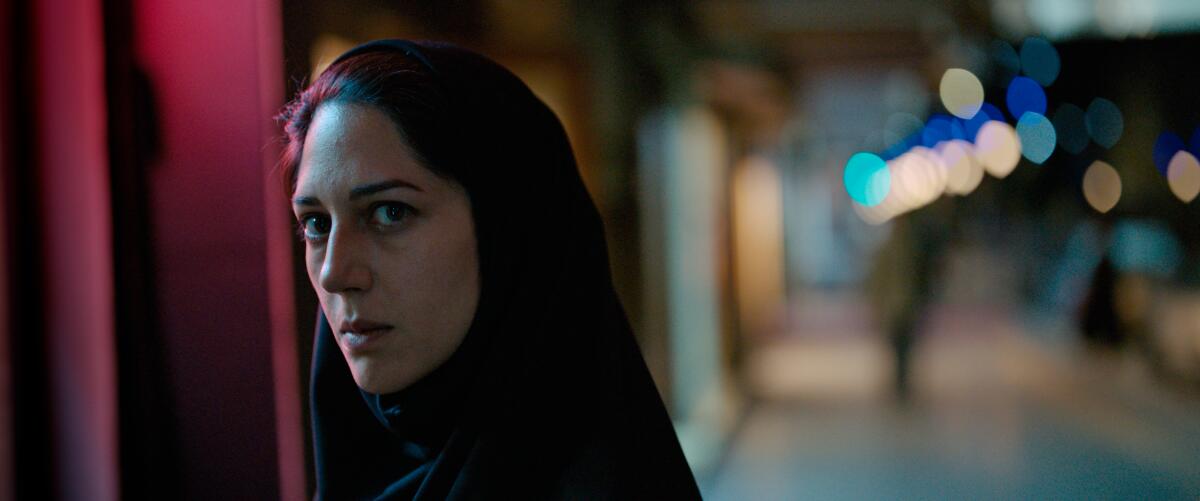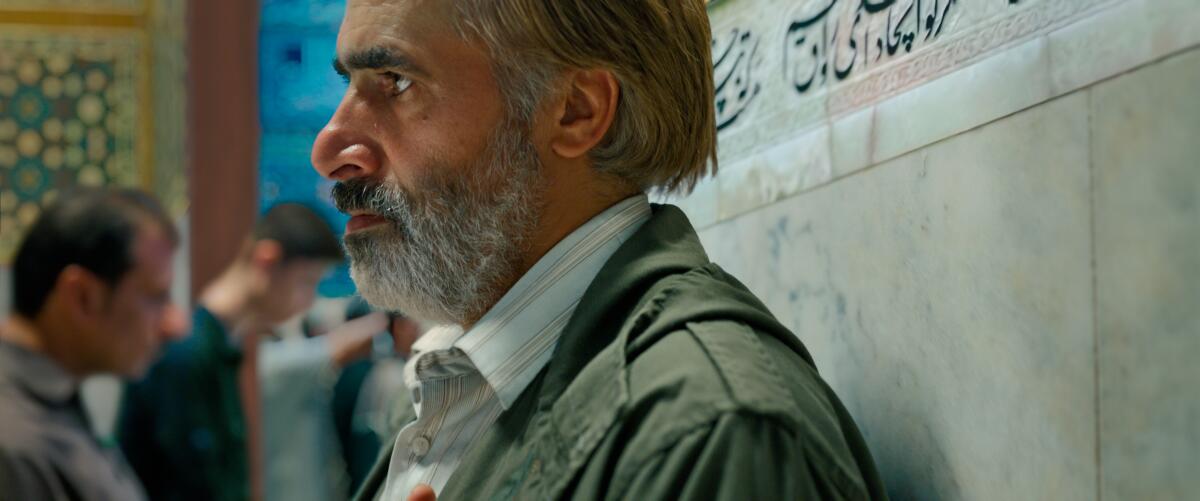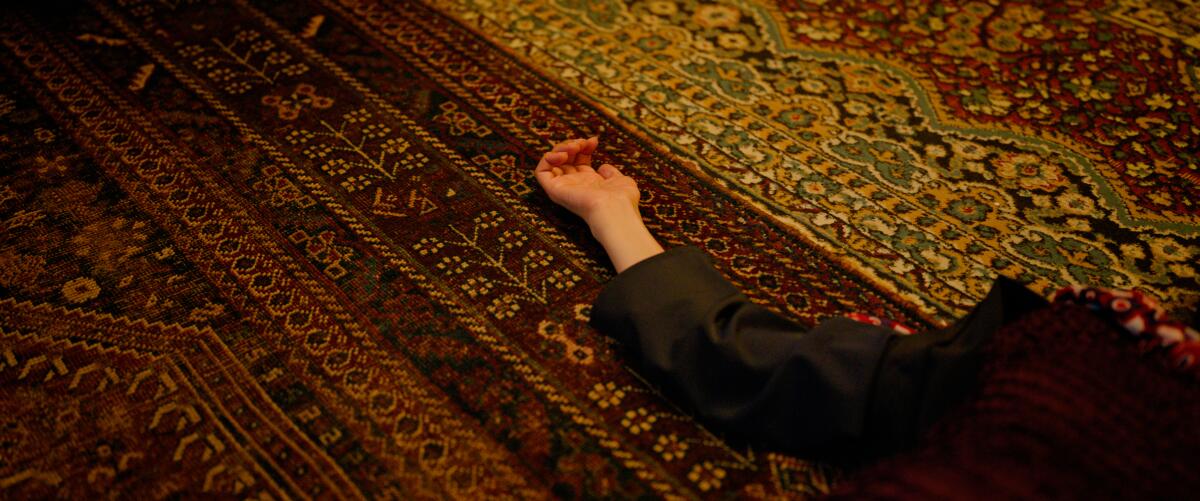Review: The serial-killer thriller ‘Holy Spider’ gets stuck in its own morally murky web

- Share via
On April 8, 2002, Saeed Hanaei was executed for the murders of 16 women between 2000 and 2001 in the Iranian city of Mashhad. The media dubbed him the “Spider Killer” for the way he lured his victims into his lair — the same apartment he shared with his unsuspecting wife and children, though like any good family man turned moonlighting murderer, he made sure they were out of the way before getting his hands dirty. In his confession, Hanaei said he had specifically targeted sex workers as part of a God-given mission to cleanse Mashhad, often thought of as Iran’s spiritual capital, of sin and vice. One of the story’s more repugnant developments was just how many people — from friends and family members to journalists and religious leaders — agreed with and even applauded his actions.
That’s meant to be the chilling upshot of “Holy Spider,” a capably acted, resourcefully made and ultimately self-defeating thriller about Hanaei’s crimes and the widespread culture of misogyny from which they sprang. It’s the latest from Iranian-born, Denmark-based director Ali Abbasi after his Oscar-nominated 2018 feature, “Border,” a genre-blurring mashup of beastie prosthetics, weird sex and antixenophobic politics. After that wildly imaginative horror-fantasy, few likely expected Abbasi to pivot to true crime, though a signature whiff of transgression remains. The mere notion of a movie about an Iranian serial killer might sound shockingly incongruous, at least for those whose notions of the country’s cinema begin and end with critically lionized auteurs like Jafar Panahi and Abbas Kiarostami.
For your safety
The Times is committed to reviewing theatrical film releases during the COVID-19 pandemic. Because moviegoing carries risks during this time, we remind readers to follow health and safety guidelines as outlined by the CDC and local health officials.
Here it may be worth noting that “Holy Spider” is a Danish-German-Swedish-French co-production and was shot entirely in Jordan. Filming in Iran was out of the question, given the extremity of the movie’s content — a graphic early sex act, followed by equally graphic violence — and the admirable bluntness of its politics. Abbasi’s script, which he wrote with Afshin Kamran Bahrami, diagnoses Hanaei’s horrific deeds as just an unusually concentrated variant of a much more pervasive societal malaise. To that end, the writers tell this grimly multitasking story through the eyes of two leads: the killer, here renamed Saeed Azimi (Mehdi Bajestani), and a fictional investigative reporter, Rahimi (Zar Amir Ebrahimi), who has come to Mashhad to track him down.

There’s an appreciably dialectical sense of purpose to this framing that goes beyond the usual cat-and-mouse genre formulations. Saeed is a veteran of the Iran-Iraq War and a devout Shia Muslim, and it’s his privileged place in society that allows him to commit and nearly get away with his crimes. By contrast, Rahimi, a progressive-minded woman who chafes against societal restrictions, is subjected to continual accusations and insinuations by the men around her. An insensitive colleague resurfaces nasty rumors about her; a hotel clerk, seeing that she’s unmarried, tries to turn her away and orders her to tighten her hijab.
Even those misogynist microaggressions carry an unmistakable resonance now, months after the movie’s premiere at Cannes, where Ebrahimi’s doggedly sympathetic performance won an acting prize. (Ebrahimi, who also served as the movie’s casting director, herself fled Iran in 2008 under circumstances that can only have reinforced her identification with her character.) Really, the most notable thing about “Holy Spider” might be its timing: This dramatization of a two-decades-old case arrives in American theaters at an extraordinarily convulsive moment for the Islamic Republic, ignited by the death of 22-year-old Mahsa Amini while she was in the custody of Iran’s morality police. She had allegedly violated the country’s laws mandating hijabs and modest dress — laws that Iranian women worldwide have now been defying in fiery protest.
It’s hard not to think about those protests as you watch the movie, especially its many disturbing, dubiously framed scenes of Saeed strangling women with their own hijabs. (The subtext of that particular M.O. is so obvious, it hardly counts as subtext.) In the brief moments we spend with the women before their deaths (they’re played by Alice Rahimi, Ariane Naziri and Sara Fazilat), Abbasi does succeed at turning passing observations into incisive social critique. He shows us wrenching glimpses of poverty and addiction; later, in the aftermath of tragedy, he’ll pull back to reveal neglected children and shame-faced parents. Mostly, he shows us the exhaustion in each woman’s heavily painted face as she staggers through another long, torturous night, to be pawed at and cast aside by men as blind to her humanity as her eventual killer.

“Holy Spider” itself isn’t entirely blind to that humanity, but its sympathies extend only as far as the next grisly jolt. And whenever Saeed enters the picture, a wearying, numbing shift in perspective takes place. Prowling the outskirts of Mashhad on his motorcycle, Saeed is very much the dark prince of this city, with Martin Dirkov’s hypnotic drone of a score surging on the soundtrack and the brilliant nightscape of Mashhad shimmering behind him. And after Saeed has driven his chosen victim back to his apartment, the camera approximates his vantage midstrangulation, drinking in her horror with near-fetishistic deliberation.
Once she’s dead, she becomes, for the movie’s purposes, little more than what her killer sees her as: a burden to be disposed of as swiftly as possible, and also a source of sexual arousal, which belies Saeed’s conviction that he’s operating from only the purest of motives. At this point in the history of the serial-killer narrative, of course, the deliberate transfer of an audience’s sympathies from victim to predator hardly counts as a narrative innovation or a cause for outrage; “Psycho” handled that particular switcheroo brilliantly. But “Psycho” was also six decades and several thousand serial-killer movies ago, and Hitchcock was mercifully unburdened by Abbasi’s art-house pretensions. And the moral incoherence of “Holy Spider” arises precisely from those pretensions, which the movie ultimately can’t reconcile with its garden-variety bloodlust.
That’s a shame, considering the story does build, in its second act, to an unsettlingly persuasive indictment of a society that teaches even its youngest members to hate, condemn and destroy women. But did the movie have to fixate so lovingly on that destruction, or make its chief destroyer so compelling? Bajestani, a convincing Everyman with a charismatic glower, expertly suggests the monster — and the petulant man-child — seething inside the loving, prayerful family man. It’s hardly the actor’s fault that Saeed’s perspective should finally overwhelm all others, or that “Holy Spider” should become the latest high-minded exploitation flick to wring its hands along with its characters’ necks.
‘Holy Spider’
In Persian dialogue with English subtitles
Not rated
Running time: 1 hour, 57 minutes
Playing: Starts Nov. 4 at Alamo Drafthouse Cinema Downtown Los Angeles; Laemmle Royal, West Los Angeles
More to Read
Only good movies
Get the Indie Focus newsletter, Mark Olsen's weekly guide to the world of cinema.
You may occasionally receive promotional content from the Los Angeles Times.











